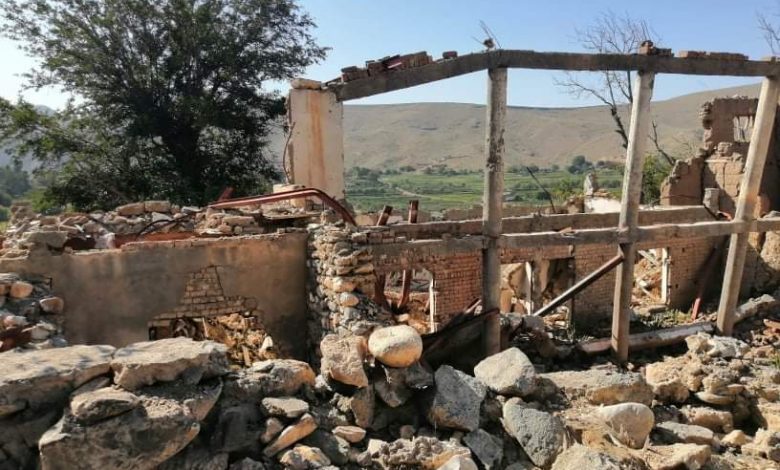Do the Innocent Afghans Deserve to Starve?

By Qasim Swati (United Kingdom)
Being the 40th largest country of the world by area, the Islamic Republic of Afghanistan is one of the most significant countries of the world strategically. Bordered by China to the northeast, Iran to the west, Pakistan to the east and south and Tajikistan, Uzbekistan and Turkmenistan to the north, Afghanistan has been playing a very important role in the history of the world for thousands of years. This is a country that has seen the rise and fall of many kingdoms and empires on its soil in history.
Pashtuns make up the largest ethnic group or ethnicity of the Afghan population. They are hugely famous for their specific characteristics or attributes, including courage, bravery, manhood or chivalry; their pledge to defend their country against any aggression; protection or defence of the weak; defence of the honour of their female population; mutual respect; faith or belief in God the Almighty; arbitration for resolving disputes among people; kindness (be kind towards others); loyalty and faithfulness to their friends, family and members of their tribe; granting refuge, protection or asylum to someone in the time of need; taking revenge against the perpetrator (s) and providing justice for the victim (s), and, above all, hospitality. These are some of the attributes that are also the components or principles of their Pashtunwali, the traditional lifestyle of the Pashtun people.
Afghanistan is famous for its melons, apricots, grapes, pomegranates, saffron, several other dry and fresh fruits, opium, cannabis and Afghan rugs as well.
However, the country is also full of natural resources, like petroleum, natural gas, precious and semi-precious stones, marble, lead, sulphur or sulfur, barytes/baryte or barite, talc, zinc, gold, chromite, rare-earth oxides/lanthanides/rare-earth metals or rare-earth elements, uranium, lithium, iron ore, copper, coal and many other minerals.
Despite having globally-renowned agricultural products, numerous mineral deposits, hardworking workforce and its unique geographical position in the region, Afghanistan has been engulfed by extreme poverty, because the several-decades-long wars have crippled the economy of the country, destabilised its political and military systems, destroyed the infrastructure of the country, damaged the education and health systems, knocked down the industries of the country, killed millions of innocent Afghans, injured a large number of them, while widowed and orphaned millions of others.
As a result of the continuous civil wars in the country, Afghanistan is said to be one among the poorest countries in the world, where poverty, unemployment, economic stagnation, political instability and the lack of law and order situation prevail. This is the reason why 42% of the total population of Afghanistan live below the poverty line, as estimated by the Afghan government.
Due to the deteriorating security situation and the sluggish economy, the national poverty rate has risen from 38% in 2011 – 2012 to 55 per cent in 2016 – 2017 and more than 50% of the population is living off less than a dollar a day, as reported by the Afghanistan Living Conditions Survey (ALCS).
These circumstances have made the agricultural industry of the country worse, increased unemployment and pushed food insecurity to rise by 14.5 per cent in a five-year-period in the country.
There are various reasons for the poverty, hunger and starvation in Afghanistan, including conflict or civil war in the country, drought, floods, illiteracy, rampant corruption and misuse of resources and other issues, like the ongoing COVID -19 pandemic, etc., in the country. For example, Afghanistan has been experiencing wars and conflicts for the last several decades, which has done the country a lot of damage. Similarly, the country faced a severe drought in 2018 – 2019, which the country still has to recover from. The country has also been hit by floods in various times and since March, 2020 have affected about 15,300 people, and killed many of Afghans throughout 18 provinces of the country, while destroyed the country’s infrastructure, as reported by Zoe Padelopoulos on borgenproject.org on July 27, 2020, titled “Why Food Insecurity and Hunger Persist in Afghanistan.” Some 11 million people live with severe food insecurity and around two million of them being children, aged five and under, according to the same report.
A report, published in The Independent by Jon Stone (the Political Correspondent) on Tuesday, 10 January, 2017, under the title “Children starving to death in Afghanistan in need of international aid, the UN warns,” has referred to the concern of the United Nations’ humanitarian arm, about the deteriorating hunger situation in Afghanistan. The report states that some 9.3 million people in Afghanistan are in need of aid, where children are dying of hunger. 1.3 million out of 1.8 million people are children under the age of five, who require help for malnutrition in the country, as warned in the report.
As referred to earlier, the COVID – 19 pandemic has added a lot to the hunger situation in Afghanistan as well, apart from conflict, drought, floods and other elements. A report in the BBC on 1 May, 2020 has put the number of Afghan children being at risk of hunger, due to the coronavirus pandemic, to be more than seven million, as the lockdown in the country decreases the number of jobs, reduces the wages of workers and increases the food prices. This is the reason why the Save the Children Fund or Save the Children (a charity, established in the United Kingdom in 1919 for providing emergency aid in war, natural disasters and other conflicts, and improving the lives of children with the help of economic opportunities, health care and better education) has claimed that a third of the country population was facing food shortages, and around 7.3 million of them were just children.
Diaa Hadid is the International Correspondent, based in NPR’s bureau, Islamabad, Pakistan, mainly covering the affairs of Afghanistan and Pakistan for NPR News (National Public Radio, an American publicly and privately funded non-profit media organization, based in Washington, D.C.), who has published a detailed report on npr.org regarding the dire starvation situation in Afghanistan on January 6, 2021. “‘I Cry At Night’: Afghan Mothers Struggle To Feed Their Children In The Pandemic,” is the start of the story which reveals the poor living conditions of the majority of Afghans, specifically after the outbreak of the COVID – 19 pandemic. A large number of people in Afghanistan do not have enough food to eat, and they have to go hungry most of the time, as there are not enough jobs for people to do, according to the report.
Although the Afghan government receives billions of US dollars in the form of foreign aid from foreign countries, especially the USA, but around 33% of the money is drained out by abuse, fraud and waste, as reported by the U. S. Office of the Special Inspector General for Afghanistan Reconstruction. Children are the most vulnerable in these conditions and some 3.1 million of the Afghan children are facing acute malnutrition, as reported by the United Nations in December, 2020.
In light of the above discussion, this is crystal clear that there are several factors responsible for the existence of starvation situation in Afghanistan, the major one among them being the conflict and the lack of law and order situation in the country, which is the result of the involvement of internal and external elements, fighting for their own vested interests within Afghanistan. Thus, this is the responsibility both of the Afghan government, other armed groups and the international community to come forward and help the innocent people of Afghanistan in such an appalling, dreadful and terrible situation by providing the Afghan people with the facilities for meeting their basic human needs and bringing peace to the country.
Qasim Swati is a freelance journalist, writer and human rights activist, based in the UK, and can be reached at https://qasimswati.com or mailto:info@qasimswati.com.

